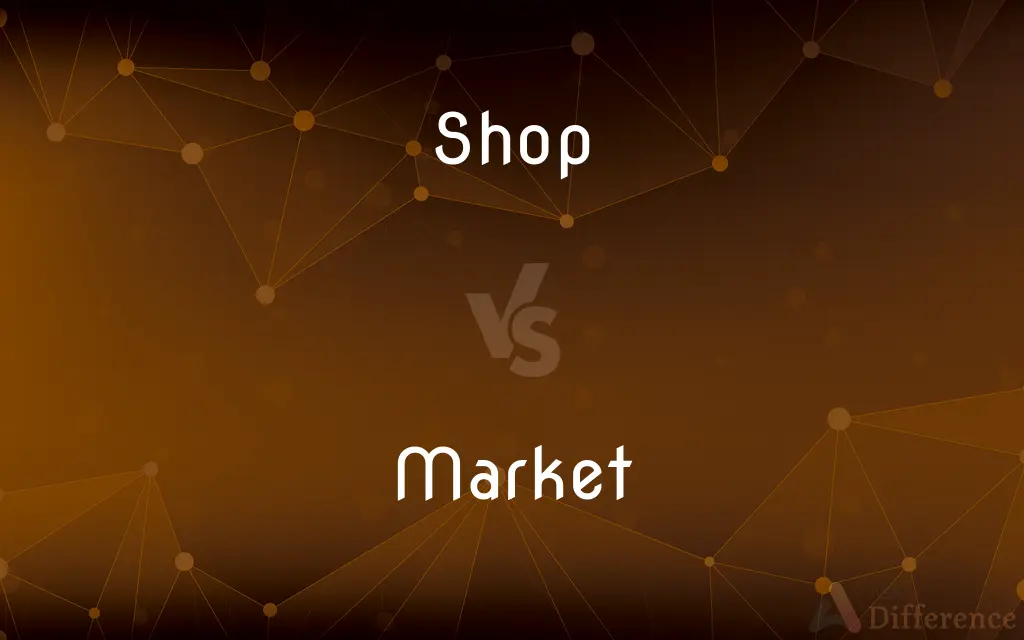Shop vs. Market — What's the Difference?
By Tayyaba Rehman & Maham Liaqat — Updated on March 1, 2024
A shop is a small retail outlet selling specific types of goods, offering a focused selection, while a market is a larger space, physical or virtual, hosting multiple vendors selling products. Shops provide specialty items, markets offer diversity.

Difference Between Shop and Market
Table of Contents
ADVERTISEMENT
Key Differences
Shops are typically standalone establishments dedicated to selling a particular category of products, such as clothing, electronics, or groceries. They offer a curated selection, catering to specific consumer needs or preferences, and often provide a more personalized shopping experience. Markets, on the other hand, encompass a broader range of goods and services, brought together under one roof or in a designated area, physical or online. They allow consumers to explore a wide variety of products from different vendors, often at competitive prices.
The scale and scope of offerings set shops and markets apart. A shop focuses on depth within its niche, offering specialized knowledge and products. Markets provide breadth, allowing customers to compare and choose from multiple options across different categories. This distinction affects the shopping experience, with shops often fostering a closer customer-service provider relationship, while markets emphasize variety and exploration.
Operational dynamics also differ. Shop owners manage their inventory, staff, and customer interactions directly, maintaining control over the shopping environment and brand presentation. Market vendors, while independently operating their stalls or online listings, collectively contribute to the market's overall atmosphere and variety, with less control over the broader shopping environment.
The choice between shopping at a shop or a market can depend on the consumer's intent. If seeking expert advice or high-quality specialty products, a shop might be preferred. For those looking for variety, the opportunity to bargain, or enjoy the experience of browsing through diverse offerings, a market could be more appealing.
The social and economic impacts of shops and markets vary. Shops, especially local ones, can strengthen community bonds by offering personalized services and supporting local economies. Markets can serve as community hubs, fostering social interactions and providing local vendors with opportunities to reach a wider audience.
ADVERTISEMENT
Comparison Chart
Size and Scope
Smaller, focused on specific product types.
Larger, offering a wide variety of products from multiple vendors.
Product Selection
Curated selection within a niche.
Diverse offerings across various categories.
Shopping Experience
More personalized, with expert advice available.
Emphasizes variety and the opportunity to compare products.
Operational Dynamics
Direct management of inventory and customer service.
Vendors operate independently but contribute to the market's collective atmosphere.
Consumer Intent
Ideal for specialized products and expertise.
Preferred for exploring a wide range of options and enjoying variety.
Compare with Definitions
Shop
Offers personalized customer service.
The camera shop provides expert advice tailored to your photography needs.
Market
A gathering of vendors selling a variety of goods.
The weekend farmer's market features local produce, crafts, and food stalls.
Shop
Usually has a singular focus or niche.
The organic food shop caters to health-conscious consumers.
Market
Encourages comparison shopping.
Shoppers at the flea market enjoy haggling for the best deals.
Shop
Operated by an individual or a small team.
The family-owned pastry shop is renowned for its custom cakes.
Market
Can be a community or social hub.
The night market is a popular spot for locals and tourists to mingle.
Shop
A small retail outlet specializing in a specific type of product.
The boutique shop offers a curated selection of handmade jewelry.
Market
Offers a wide selection from multiple vendors.
The online marketplace hosts thousands of sellers offering everything from books to electronics.
Shop
Provides a specialized shopping experience.
The vintage record shop attracts music enthusiasts looking for rare finds.
Market
Provides a diverse and dynamic shopping environment.
The holiday market offers an array of seasonal gifts and decorations from around the world.
Shop
Also shoppe A small retail store or a specialty department in a large store.
Market
A public gathering held for buying and selling goods or services
A weekly flower market.
Shop
A mercantile establishment for the retail sale of goods or services;
He bought it at a shop on Cape Cod
Market
An open space or a building where goods or services are offered for sale by multiple sellers
Bought the chair at the downtown antiques market.
Shop
A course of instruction in a trade (as carpentry or electricity);
I built a birdhouse in shop
Market
A store or shop that sells agricultural produce
Bought vegetables from the corner market.
Shop
Do one's shopping;
She goes shopping every Friday
Market
A system of exchange in which prices are determined by the interaction of multiple, competing buyers and sellers
An electronic market for trading pollution credits.
Shop
Do one's shopping at; do business with; be a customer or client of
Market
A marketplace where groceries are sold;
The grocery store included a meat market
Shop
Shop around; not necessarily buying;
I don't need help, I'm just browsing
Market
Engage in the commercial promotion, sale, or distribution of;
The company is marketing its new line of beauty products
Shop
Give away information about somebody;
He told on his classmate who had cheated on the exam
Market
Buy household supplies;
We go marketing every Saturday
Common Curiosities
Why might someone choose to shop at a market?
For the diversity of products, the ability to compare prices and items from different vendors, and the social experience of browsing through a bustling environment.
Can markets be found online?
Yes, online markets bring together numerous sellers in a virtual space, offering a vast array of products to a global audience.
Do shops offer better quality products than markets?
Shops often provide specialty items and may offer higher quality products within their niche, but markets also feature high-quality vendors; quality varies by seller and product type.
How do shopping experiences differ between a shop and a market?
Shopping at a shop is often more personalized and focused, while markets offer a broader exploration and comparison across a wide range of products.
Is it easier to find expert advice in shops or markets?
Shops, especially those specializing in certain product types, are more likely to offer expert advice due to their focused nature and expertise in their niche.
What distinguishes a shop from a market?
A shop is a single retail outlet focusing on a specific type of goods, while a market is a collection of multiple vendors offering a wide range of products.
Can you find unique items in shops?
Yes, shops, especially those specializing in handmade, vintage, or bespoke items, often offer unique products not easily found in larger markets.
How do markets impact local communities?
Markets can strengthen local economies by providing sales venues for small producers and artisans, and serve as social gathering places, enhancing community engagement.
What role do shops play in the community?
Shops, particularly local ones, can build strong customer relationships, contribute to the local economy, and enhance the community's character with their specialized offerings.
Are markets more affordable than shops?
Markets can offer competitive prices due to the variety of vendors and the opportunity for bargaining, but this is not universally true; prices vary widely.
Share Your Discovery

Previous Comparison
House vs. Dwelling
Next Comparison
Application vs. ImplementationAuthor Spotlight
Written by
Tayyaba RehmanTayyaba Rehman is a distinguished writer, currently serving as a primary contributor to askdifference.com. As a researcher in semantics and etymology, Tayyaba's passion for the complexity of languages and their distinctions has found a perfect home on the platform. Tayyaba delves into the intricacies of language, distinguishing between commonly confused words and phrases, thereby providing clarity for readers worldwide.
Co-written by
Maham Liaqat












































